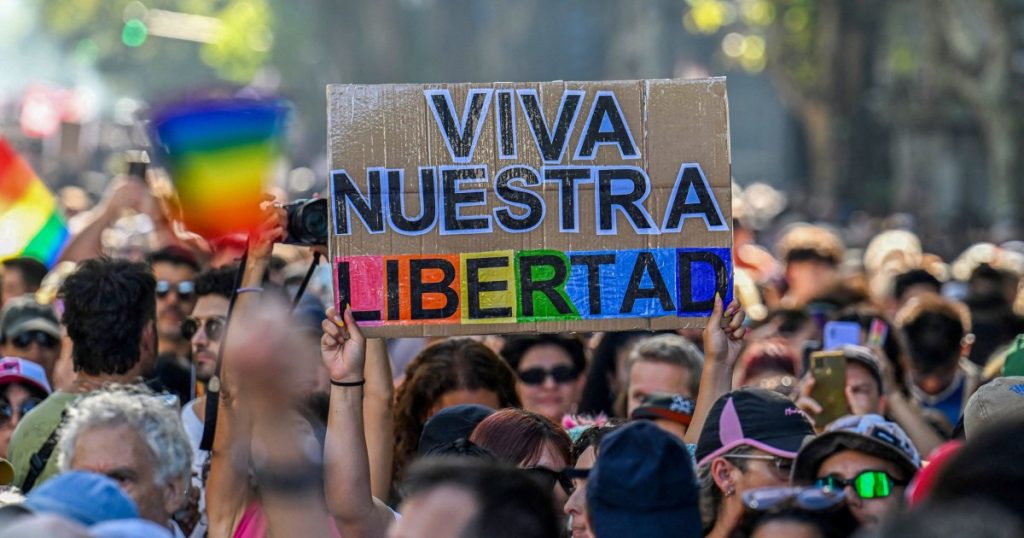The Rise of Javier Milei and the Clash Over Economic and Social Policies
In Argentina, the presidency of Javier Milei has sparked intense debate, blending praise for his economic reforms with sharp criticism of his conservative social views. Milei, an economist and former media personality, swept into power in 2023 on a platform of libertarian economic policies. His measures have stabilized the economy, reducing inflation and reversing a deep fiscal deficit, earning him support from economists and investors. However, his outspoken opposition to progressive social issues, such as feminism, abortion, and gender identity, has ignited controversy in a country known for its liberal reforms in Latin America.
Milei’s recent comments at Davos, where he equated extreme forms of “gender ideology” with child abuse, have drawn particular outrage. He cited a case of a U.S. gay couple jailed for abusing their adopted children, claiming, “In its most extreme versions, gender ideology constitutes child abuse, plain and simple. They are pedophiles.” These remarks have been widely condemned by LGBTQ+ rights activists, who view the term “gender ideology” as a dehumanizing trope used to attack progressive values. For many Argentines, including supporters like pediatrician Carlos Kambourian, who identify as gay, Milei’s words crossed a line. “I cannot support a person who tells me that I am a pedophile because I fell in love with a man,” Kambourian said, joining thousands in protests against the president’s statements.
A Nation Divided: Economic Recovery vs. Social Backlash
Despite the backlash, Milei’s economic policies have resonated with many Argentines. Polls show that just over half of the population approves of his leadership and his handling of the economy. However, his social views are far more divisive. Only 40% of Argentines support his stance on homosexuality, while 50% oppose it. Similarly, a proposed “equality before the law” bill, which would remove protections for women and non-binary individuals, faces significant opposition, with 51% of the population disapproving of the plan.
The tension between economic progress and social regression is evident in the streets. While thousands protested Milei’s comments in early February, many others believe the government should focus on economic recovery rather than rolling back hard-won social rights. “This government has done some positive macroeconomic things, but on social issues, it’s backwards,” said Alberto Nigro, a 65-year-old statistician. For some, the economic gains are undeniable, but they fear the cost to social progress.
The Shifting Landscape of Social Rights in Argentina
Argentina has long been a regional leader in progressive reforms, legalizing same-sex marriage in 2010, passing a gender identity law in 2012, and relaxing abortion restrictions in 2020. These advancements have been celebrated as milestones for equality. However, under Milei’s leadership, the government has taken steps to unwind these gains. Several agencies focused on gender equality and discrimination have been closed, including the Ministry of Women, Genders, and Diversity and the National Institute against Discrimination, Xenophobia, and Racism (INADI).
For activists like María Rachid, president of the Argentine LGBT Federation, Milei’s rhetoric and policies have created a dangerous environment. “Since Milei’s campaign, even before taking office, we have registered a lot of violence, discrimination, and hatred towards our community,” she said. While the government claims that femicide rates dropped by 10% last year, women’s rights groups dispute this, citing independent data showing a slight increase in gender-based violence. The debate over Milei’s social agenda has exposed deep fault lines in Argentine society, with many fearing that the country is moving backward on issues of equality and justice.
The Protests and the Fight for Progressive Values
The backlash against Milei’s comments has been swift and decisive. Thousands of Argentines, including students, union members, opposition politicians, and LGBTQ+ advocates, joined “anti-fascist” protests in cities across the country. For many, the demonstrations were a defense of diversity and progressive values. “We can’t allow diversity to be erased,” said Cintia Vignot, a 42-year-old teacher who attended the march. “As a citizen, as a teacher, as a mother, I say no.”
Yet, not all Argentines support the protests. Only 44% of the population backed the recent marches, reflecting the broader divisions in the country. While Milei’s government argues that it supports individual freedoms and opposes special protections for certain groups, critics see his policies as an assault on hard-won rights. As Argentina navigates this fraught terrain, the balance between economic recovery and social progress remains a central question. For now, the country is left grappling with the legacy of its progressive past and the uncertain future under Milei’s leadership.
The Broader Implications of Milei’s Presidency
Milei’s presidency has significant implications not only for Argentina but also for the broader region. As a close ideological ally of former U.S. President Donald Trump, Milei represents a resurgence of conservative populism in Latin America. His focus on economic liberalism paired with social conservatism has appealing to some, particularly in light of Argentina’s economic turmoil. However, his attacks on progressive values have raised concerns about the erosion of democratic norms and the protection of minority rights.
The debate over Milei’s leadership underscores the challenges of reconciling economic and social priorities in a deeply unequal society. While his economic measures have stabilized the country, the cost to social progress has been steep. For many Argentines, the question is whether the benefits of economic reform outweigh the risks of rolling back rights. As the country moves forward, the legacy of Milei’s presidency will likely be defined by this tension between economic recovery and social justice.












